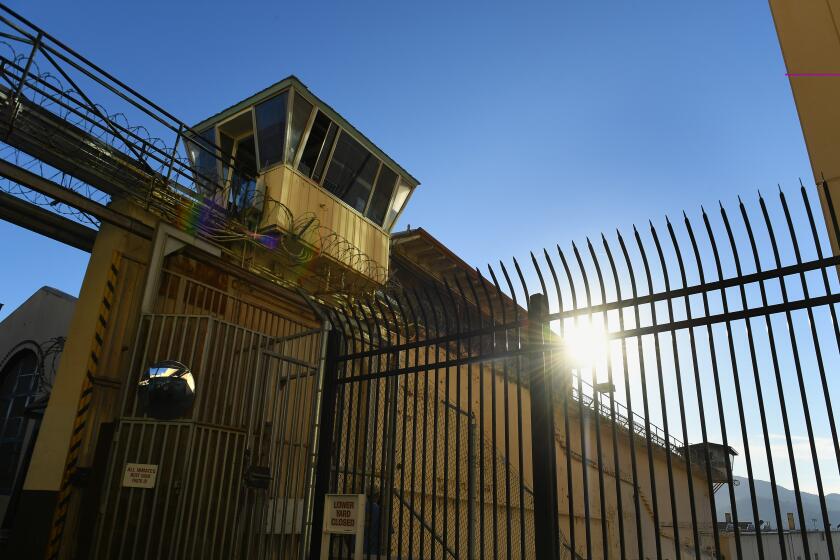L.A. County Probation Dept. should handle new parolees
Thousands of new parolees are coming to Los Angeles County as part of the state’s effort to ease prison overcrowding. To deal with them, the Board of Supervisors faces two options, both abysmal. It could assign the former state prisoners to the foundering Probation Department, which has demonstrated an inability to keep adequate records, discipline wayward employees and properly supervise troubled youths, and is under scrutiny by the U.S. Department of Justice. Or it could pick the Sheriff’s Department, which has its own history of difficulties and is currently being monitored by the federal government for its failures in county jails.
With the parolees comes state funding, and each department is eager to take on the new task and accept the new money. Past behavior suggests neither department is up to the job — but in the end it has to be one or the other. The supervisors must be tempted to wash their hands of the problem and send the parolees to Sheriff Lee Baca, who is elected and whom the supervisors ultimately can hang out to dry if his program fails. But that would be the wrong move. For all its troubles, the Probation Department, which oversees residents on probation as well as the county’s juvenile detention facilities, is the proper agency to handle the coming population.
That should not be mistaken for a vote of confidence in the Probation Department. To the contrary, that department is, and long has been, a mess.
For more than a decade, the Justice Department has been monitoring the agency as a consequence of a host of appalling conditions in the juvenile justice portion of its operation. Juvenile halls were cited for deficient medical and mental healthcare. Education of youths in county custody was found to be woefully inadequate. The department was warned about its failure to protect youths from one another — and in some cases, from Probation Department staff. The juvenile halls, which are generally reserved for youths accused of crimes who are awaiting their court hearings, were instead being used as places of punishment.
At the youth camps, where young offenders are sent after being found guilty of crimes, the Justice Department found constitutional violations. And yet those problems persist.
Meanwhile, employees have been arrested for misuse of public funds, for theft and for inappropriate conduct with probationers.
That would seem to offer an argument for another department to take on the new duties, and that’s what Baca has proposed. The sheriff says his department is prepared to take over the job in October, when the state is expected to begin releasing inmates. Under Baca’s plan, his department would receive $37.5 million in the first year. The funds would not be used for any new hires; instead, the sheriff would transfer 146 deputies and support staff out of the jails and patrol services and into the role of supervising parolees. Los Angeles Police Department staff would also be brought in, Baca’s office said.
But Baca’s department has its own litany of difficulties, and it too is under federal scrutiny. In June, the FBI confirmed it was investigating allegations that two sheriff’s deputies assigned to the Twin Towers jail beat an inmate unconscious and then attempted to cover up the incident. The Department of Justice has been monitoring the jails since 1996 over failure to provide adequate mental health services to inmates. And since 1978, a federal court has repeatedly ordered the Sheriff’s Department to improve conditions and reduce overcrowding at the jails.
Moreover, the department’s chief responsibility is to enforce the law, not to help rehabilitate those who are trying to stay out of jail, which is a big part of what parole is about. L.A. County would be the first in the state to hand off the supervision of parolees to a sheriff’s department. This duty thus not only would tax the sheriff’s resources but would involve his department in areas beyond its traditional expertise. Baca has said his plan would take from six months to a year to be fully operational. Quite frankly, the county can’t afford to wait.
The tragedy of the county’s predicament is that the arrival of new state parolees ought to be an opportunity to focus on the reentry of these ex-prisoners into society. It should fall to churches, mosques and synagogues, to nonprofit organizations, to schools, but above all to county government to ensure that those leaving institutions and reentering their neighborhoods do so in a way that maximizes their chance to become productive and law-abiding citizens.
Even the parolees expected to come to Los Angeles County — those whose crimes were nonviolent, non-sexual and relatively low-level — are more likely than the state’s population at large to be sick, addicted, mentally ill, poorly educated and unemployable. Given that California’s state prison system has disinvested in prisoner care and rehabilitation, the parolees are unlikely to come home any better prepared to lead productive lives than when they went in. Indeed, the failure of the state’s parole efforts is one of the best arguments for turning this responsibility over to local governments, which at least have a fighting chance.
Los Angeles County has done little to prepare for this opportunity, and it must now suffer the consequences of its past mismanagement. Forced to pick between two troubled agencies, it should take the one that at least encompasses the mission. The county employees best experienced and oriented toward that task are probation workers.
More to Read
A cure for the common opinion
Get thought-provoking perspectives with our weekly newsletter.
You may occasionally receive promotional content from the Los Angeles Times.










